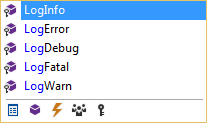In this Article I'm going to explain how to Log information in your component.
- List
- Setup
- Simple Component
- Deploy
- Help File
- Logging (this)
- Inputs
- Inspecting other Components
- Creating Globals
- Creating Project Properties
- Working with SQL
- Working with a Web Service
There are times when you wish to log information to the Workflow Logs, for the Project the component is in.
[Install Drive]:\Program Files\Workflow\Logs\*.log
There are a number of log levels you can choose from.
Take the Create Log Entry as an example of which.
- Info
- Error
- Debug
- Fatal
- Warn
We have a number of logging methods since we inherit from "AbstractSinglePathProcessComponent" => "AbstractSinglePathComponent" => "AbstractOrchestrationComponent"
namespace LogicBase.Core
{
public abstract class AbstractOrchestrationComponent : IStorable, IOrchestrationComponent, IValidWithNofication, IValid
{
...
protected void LogDebug(IData data, string Debug);
protected void LogError(IData data, Exception ex);
protected void LogError(IData data, string message);
protected void LogError(IData data, Exception ex, string message);
protected void LogFatal(IData data, string message);
protected void LogFatal(IData data, string message, Exception ex);
protected void LogInfo(IData data, string Info);
protected void LogWarn(IData data, string message);
...
}
}
If we start typing Log into VS we will get autocompletion for the following methods.

We could either call
base.LogError(data, "No rows found.");
Or base. isn't necessary.
LogError(data, "No rows found.");
Another thing I tend to do is add a Checkbox to the component and use that as a way to decide whether to log the information information. You could pass in a Debug flag.
Another option it to always log to Info then turn on the logging level in Workflow Explorer.
